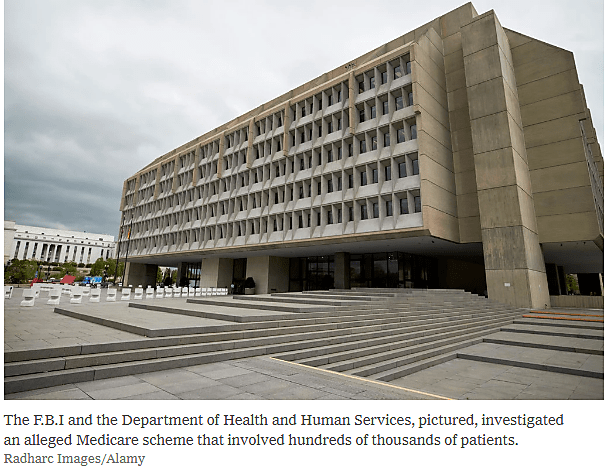The $768 billion Medicare program is in deep trouble as America ages and elderly health care soars in cost. Medicare is a giant central planning scheme that imposes more than 100,000 pages of regulations and related rules on more than 600,000 health care providers.
The inefficiency is vast, and the structure of the program makes it a perfect target for fraud and abuse. The system processes more than a billion provider claims a year. Auditors estimate that more than $50 billion of taxpayer money goes down the drain every year from improper payments. The New York Times highlights some alleged scams today stemming from a recent federal bust.
Congress should end traditional Medicare and give each enrollee a voucher to purchase a health plan of his or her choice. Funding Medicare through fixed-dollar vouchers would give enrollees more control over their medical care, encourage cost consciousness, spur innovation by eliminating price controls, and restrain spending.
A voucher-based system would also greatly reduce fraud because massive, complex, and open-ended federal billing would be replaced by simpler fixed payments to individuals.
Here is an excerpt from the NYT story. Fortunately, investigators caught these alleged fraudsters, but the article illustrates the vulnerability of the system where scam artists can rack up apparently bogus charges of more than $200 million.
Federal officials said Tuesday that they had dismantled a $1.2 billion Medicare scheme that spanned continents and ensnared hundreds of thousands of unsuspecting elderly and disabled patients.
Under the scheme, which the authorities described as one of the largest health care frauds in United States history, doctors prescribed back, shoulder, wrist and knee braces that were not needed, prosecutors said. Twenty-four people were charged, according to the Justice Department.
“These defendants — who range from corporate executives to medical professionals — allegedly participated in an expansive and sophisticated fraud to exploit telemedicine technology meant for patients otherwise unable to access health care,” Brian Benczkowski, the assistant attorney general for the department’s criminal division, said in a statement.
Some of the accused were owners of durable medical equipment companies that paid kickbacks and bribes to doctors to write prescriptions for braces that were medically unnecessary, according to the authorities.
An international telemarketing network with call centers in the Philippines and Latin America would reach out to Medicare beneficiaries, persuading them to get the free or low-cost braces. The doctors would sometimes write prescriptions without speaking to the patient.
“The defendants took advantage of unwitting patients who were simply trying to get relief from their health concerns,” Craig Carpenito, the United States attorney for New Jersey, said in a statement. “Instead, the defendants preyed upon their weakened state and pushed millions of dollars’ worth of unnecessary medical devices, which Medicare paid for, and then set up an elaborate system for laundering their ill-gotten proceeds.”
The defendants laundered the proceeds through international shell companies and used the money to buy exotic cars, yachts and luxury real estate around the world, the authorities said.
Prosecutors brought charges related to the payment of bribes, illegal kickbacks, money laundering and conspiracy to commit health care fraud against people in California, Florida, New Jersey, Pennsylvania, South Carolina and Texas.
… In Florida, Willie McNeal IV, the owner and chief executive of two telemedicine companies, hired health care providers and then paid them to prescribe braces for Medicare beneficiaries regardless of whether it was medically necessary, according to an indictment. Mr. McNeal would then receive illegal kickbacks in exchange for ordering those braces, the indictment said.
Mr. McNeal, 42, facilitated the submission of fraudulent Medicare claims worth nearly $250 million, the government said.
… In a case out of South Carolina, more than a dozen companies owned by Andrew Chmiel, 43, billed Medicare for more than $200 million as part of a scheme to sell medically unnecessary equipment, according to an indictment.
By the way, the HHS headquarters building ranks as one of the ugliest in Washington. As this blogger notes, the federal government only hired architects with early onset glaucoma during the 1960s and 1970s.
However, it is also true that the Soviet-style brutalist design for HHS is ideal for a bureaucracy that imposes top-down central planning on a large part of the economy. The harshness of the building is a metaphor for the cold treatment of the citizenry under government-imposed planning schemes.

